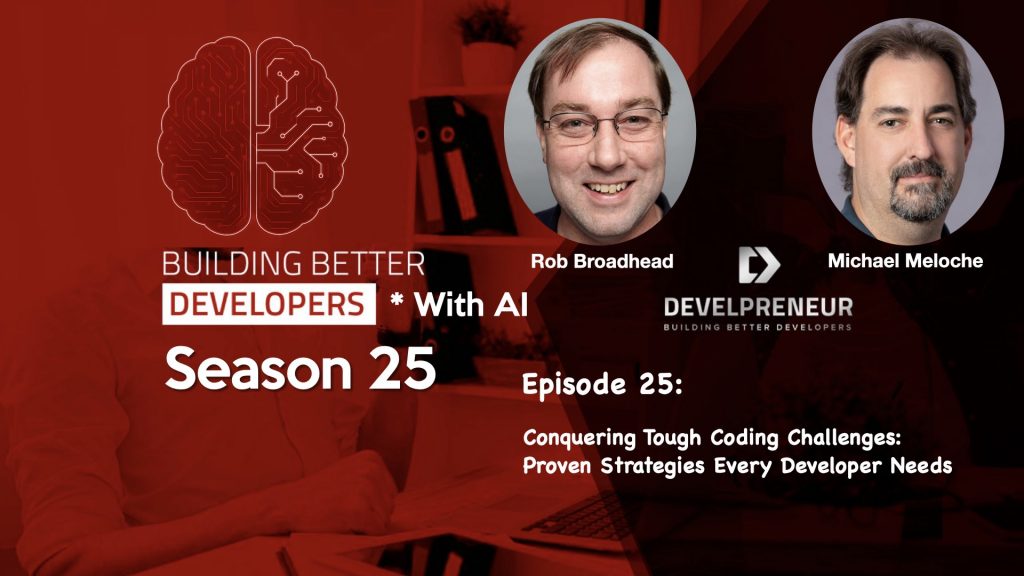In this episode of Building Better Developers with AI, Rob Broadhead and Michael Meloche revisit one of their most memorable past discussions: “Unpacking ‘Psychopaths’ Scenarios and Tough Coding Challenges.” That earlier conversation explored the “opposite of the happy path”—those frustrating moments where unclear requirements, unrealistic expectations, or hidden bugs make coding feel nearly impossible.
Now, with the help of AI prompts and fresh anecdotes, the hosts take a lighthearted but practical look at how developers can survive tough coding challenges and even grow stronger through them.
Revisiting Past Tough Coding Challenges
The original “psychopath” metaphor described the bizarre, unpredictable situations developers encounter—like half-baked requirements or strange user paths no one expected. In this revisit, Rob and Michael highlight how tough coding challenges remain timeless.
Unclear specs still lead to messy solutions and wasted effort. Requirements written on napkins, “urgent” tickets with no prioritization, or unrealistic interview questions all qualify as classic tough coding challenges that force developers to adapt.
Common Tough Coding Challenges Developers Face
The hosts share a humorous “starter pack” of scenarios every developer will recognize:
- Legacy code packed with seven levels of nested if statements.
- Interview questions that ask you to “write a compiler on a whiteboard.”
- A vague spec that says only: “Make it user-friendly.”
- A “small change” that balloons into a complete rewrite.
Though exaggerated, these challenges highlight a real issue: projects succeed when expectations are realistic and communication is consistent.
Developer War Stories
Rob and Michael also revisit their personal developer war stories:
- The Semicolon Bug – Days lost to a missing character when linters weren’t in place.
- The “Everything is Urgent” Boss – Prioritization chaos that left the team paralyzed.
- Merge Conflicts – Overwritten code when developers skipped repositories and unit tests.
Teams that ignore coding standards and repositories will keep reliving the same tough coding challenges.c
Coping Strategies for Tough Coding Challenges
Surviving the madness takes both discipline and humor. The hosts share practical coping strategies, such as:
- Rubber Duck Debugging – Explaining the problem out loud often sparks insights.
- Snacks and Caffeine – Reward yourself for solving a challenge.
- Take Breaks – Walking away can reveal solutions faster than brute force coding.
Michael also warns against the “ship it and patch later” mentality, pointing to unstable game launches and OS rollouts as cautionary tales.
How Tough Coding Challenges Build Superpowers
The conversation closes on a positive note: tough coding challenges don’t just test developers, they strengthen them.
- Debugging Ninjas spot subtle errors instantly.
- Documentation Detectives can decipher legacy systems with ease.
- Interview Survivors gain confidence from handling curveball puzzles.
Michael encourages developers to document their solutions and share them with the community. Not only does this help others, but it also creates a reference point for your future self when the same challenge reappears.
Final Takeaway
Revisiting the original “Psychopaths” episode with a fresh perspective shows that while technology evolves, tough coding challenges never go away. What changes is how developers respond. With clear requirements, strong processes, and healthy coping strategies, chaos can be transformed into growth—and even a little humor along the way.
Stay Connected: Join the Developreneur Community
We invite you to join our community and share your coding journey with us. Whether you’re a seasoned developer or just starting, there’s always room to learn and grow together. Contact us at [email protected] with your questions, feedback, or suggestions for future episodes. Together, let’s continue exploring the exciting world of software development.
Additional Resources
- User Stories Unveiled: A Developer’s Guide to Capturing the Full Narrative
- Misdirection Anti-Pattern: Solving The Wrong Problem
- Software Development Requirements: Staying True to Specifications
- The Importance of Properly Defining Requirements
- The Developer Journey Videos – With Bonus Content
- Building Better Developers With AI Podcast Videos – With Bonus Content

